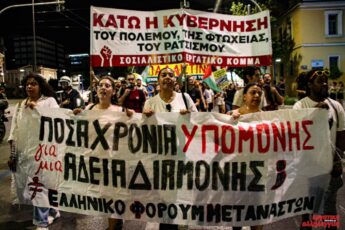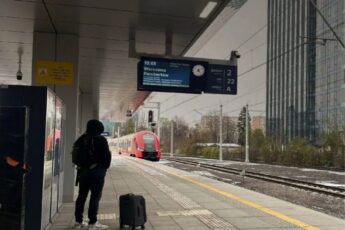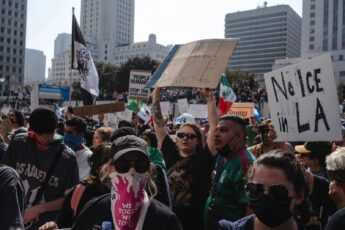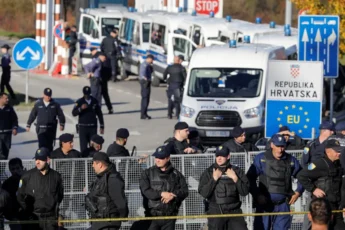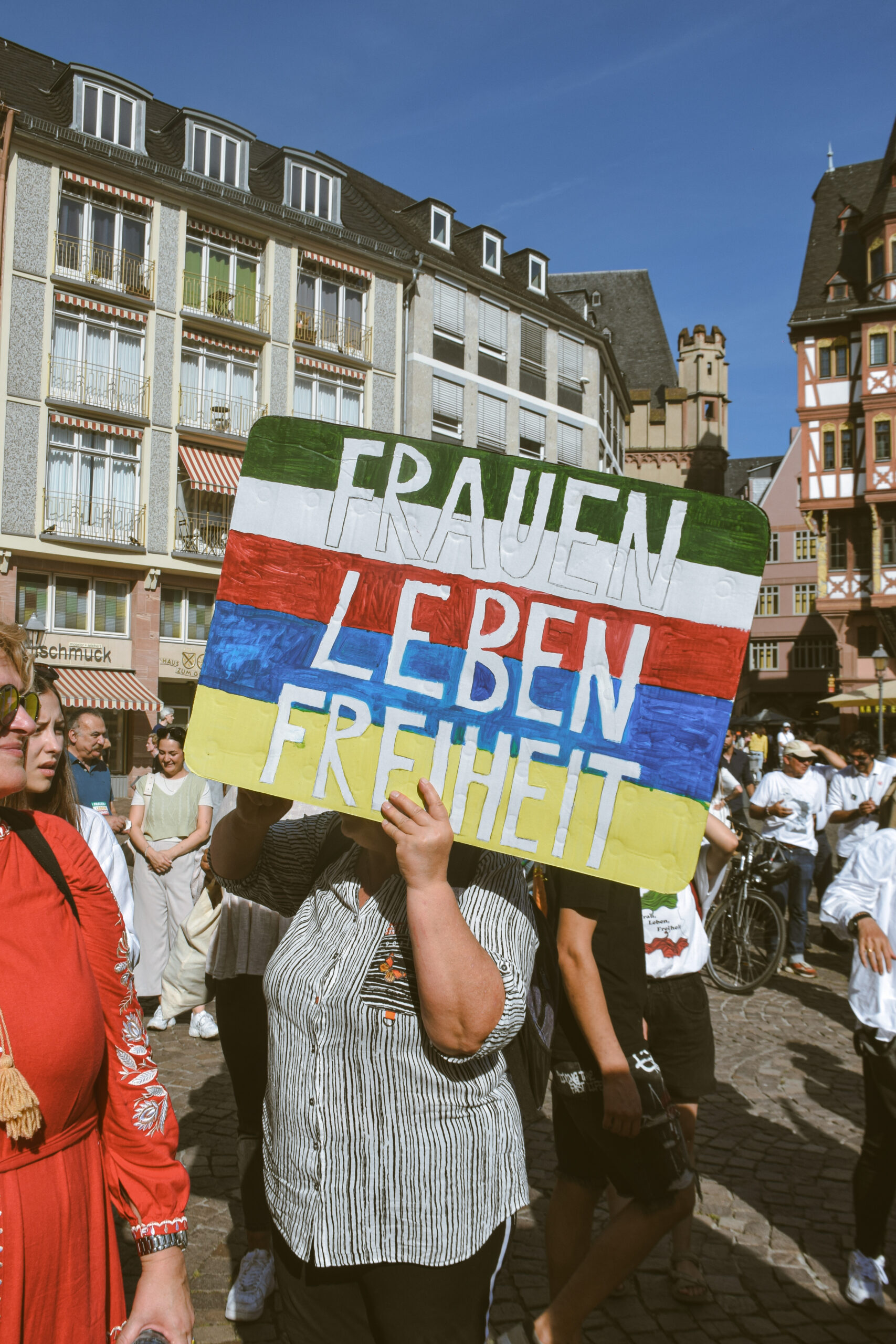
Interview with Sajedeh Jalali
Sajedeh Jalali is an Iranian migrant who lived in Italy for several years and now resides in Germany. She has first joined the Women’s Assembly of the Migrant Coordination in Bologna and later the Transnational Migrants Coordination. In the interview, Sajedeh talks about the difficulties she faced in obtaining a residence permit due to institutional racism in both countries and how the increasingly violent racism, shared by various German political parties, is making life more difficult for migrants in Germany, particularly for women. Regarding her country of origin, Sajedeh speaks about the persistent oppression of Iranian women through the Hijab Law and women’s relentless struggles. In the context of the genocide in Palestine and the expansion of war in Lebanon, Syria, and the entire Middle Eastern region, women play a central role in fighting simultaneously against war and against the oppression and violence perpetrated on women in armed conflicts and by various religious fundamentalisms.
As a non EU-migrant who has been living in Italy and Germany for some years now, can you tell us about the main difficulties that you had to face with the bureaucracy, at work, and in general in the daily life?
Bureaucracy in Italy is notoriously slow. There were cases where people waited over a year to receive their permesso di soggiorno (residency permit) because the card’s arrival overlapped with its expiration date. Personally, I had to endure long waiting periods with no updates on my case and no way to contact anyone for clarification. You’re essentially waiting in the dark until the permesso di soggiorno finally arrives at the police station in your city of residence, and even then, you only find out when it’s available for pickup.
To get the residence permit requires a lot of documents and strict requirements. For example, in my case, to get a residence permit for studying I needed the proof of enrollment at the University, but also enough money in bank account, to buy an insurance, and a housing contract. Having your residence permit is not only necessary to stay in Italy, but also if you want to leave. So for example, when I wanted to apply for jobs in Germany, I couldn’t do that until the office issued the document, and sometimes they issue a document which is already expired.
In Germany’s bureaucracy is highly structured but feels overly regulated and rigid. Currently, I’m facing accusations of entering Germany illegally, despite having a valid residence permit at the time. There were two cases against me: one raised by the German police and one raised by the German immigration office (Ausländerbehӧrde). They’re claiming I overstayed my permitted duration. They are also mentioning some laws about the work permit, which I was not aware of at the time of the working visa application. Despite presenting evidence to clarify my situation and having a working contract, they’ve opened a case against me, and I now have to go to court.
Both in Italy and in Germany housing contract, job contract, insurance, residence permit they are linked one to another, and if you lose one you lose another. It is your employer who decides how long your working VISA can last, by deciding how long your job contract is. At the same time, if you lose your residence permit, you can’t apply for a job.
The tightening of regulations in recent years reflects a broader trend of restrictions on migrants’ mobility and rights. I also noticed that they tend to ask you to apply for refugee status. In this way, you are more controlled, because if you are a refugee you have to go to a camp. These camps are on purpose organised out of the city, in very isolated places.
What are the specific difficulties that migrant women have to face? Have you noticed some changes in the living and working conditions of migrant women, especially since the outbreak of the war?
Migrant women face numerous difficulties, including finding stable, well-paid jobs and securing safe housing in secure areas. Sometimes they even feel excluded or invisible in secondary spaces.
The blackmail of losing the residence permit is particularly heavy for migrant women when their right to stay is linked to being married, because they experience a double violence. For example, I know the story of a woman who is in an abusive relationship with her husband, and she is desperately looking for a job to get a working VISA. She is under a lot of pressure and she had no luck so far, and therefore she can’t divorce.
The spread of war has only exacerbated these issues, increasing displacement and vulnerability. As conflict forces more women to migrate, they are further marginalized by policies that often treat them as second-class citizens, and subject to exploitation and discrimination in both the workplace, creative atmospheres, and housing markets.
In Germany, the political scenario has changed drastically in a very short time. From welcoming the Syrian refugees in 2015, politicians are now openly talking about “re-migrations”, i.e. to deport migrants even if they’ve already obtained German citizenship. Even the SPD says that only migrants who are “useful” for the economy should be tolerated. Few weeks before the elections, the CDU voted together with the AfD (the neo-nazi party) for stricter measures on migration. What is going on and why do you think this has happened?
What we’re witnessing is a rise in populist ideology that uses migrants as blame for societal problems, even when those issues aren’t caused by them. The AfD has capitalized on isolated incidents and amplified anti-migrant propaganda to fuel fear and division, which has unfortunately gained attention. Their policy is now influencing mainstream parties, with even the SPD adopting an economic-utilitarian view of migrants. They want to keep only skilled migrants, and to treat us only as cheap labour force.
This shift reflects a disturbing normalization of exclusionary politics. As the AfD gains momentum ahead of the upcoming elections, Personally, if the AfD were to come to power, I’d have to seriously reconsider my future in Germany, as their policies and ideology would make it increasingly difficult for migrants like me to live here. CDU made a mistake, this is something serious we are talking about, and people now know what their real intentions are.
Migrant and anti-racist struggles are going through hard times everywhere and for different reasons: politics moving to the right, increasing authoritarianism, more fragmentation of the struggles, weaker social movements, and so on. What do you think is urgent to do now for anti-racist movements, in order to give more power to migrant struggles and to oppose the general shift of politics to the right, in the EU and beyond?
The opposition must continue, no matter how challenging the circumstances, as it is vital for the growth and inclusivity of society. Anti-racist movements should focus on engaging with young people through education and open dialogue, allowing for constructive criticism and fostering active participation. Regular sessions with committed individuals can help sustain momentum, create meaningful change, and strengthen solidarity across movements. Ultimately, persistence, education, and collaboration are essential to oppose the broader political shift to the right and to empower migrant struggles within and beyond the EU.
You come from Iran, where the struggle against the authoritarian and obscurantist regime continues, despite brutal repression and international isolation. Women in particular have been protesting against patriarchal violence in its most fundamentalist form. Do you think things are changing now, also considering what has happened in Syria, Lebanon and Palestine? How can a transnational feminist movement give more power to Iranian women and the opposition in this particular moment of world war scenario?
There’s a growing sense of hope in the Middle East as change develops, and the ongoing struggles of women in Iran are major to this transformation. A month ago, the Parliament passed a law, “The Hijab Law”, although it is not yet announced. This law criminalizes women without Hijab, punishing them with prison and strokes. But they know that if they announce that this law has passed, there will be huge of problems for them. Thousands of women without Hijab are now taking the street. There are so many that do not want to do it, and fight everyday… So many…
Why is it hijab so important for the government? There are different ways to see it. Nasrin Sotudeh, who is a human rights activist, said that if the government can put a scarf on your head, it can put also other things… It is a way to control you, as a woman. According to my history teacher, hijab is like the valve of a pressure cooker: they can lift it in the moment when the situation is getting too risky for them, that is, they can alleviate social unrest by being more elastic with the hijab. Another way to see it is like Masih Alinejad does: hijab it is like the Berlin wall, if it falls other things fall too. Hijab is the way men can control women; to avoid girls getting rebellious, it is the way to keep things as they are.
A transnational feminist movement can play a crucial role in amplifying the voices of Iranian women, whose courage and resistance against patriarchal violence are inspiring global solidarity. The motto “Woman, Life, Freedom” is not just a slogan but a call to action. Supporting Iranian women means more than just raising awareness—it’s about actively spreading the word about their resistance, sharing their stories of bravery.
The struggles of women in Middle East are deeply interconnected and a transnational feminist network can help strengthen these movements by fostering solidarity across borders, pressuring international bodies, and challenging the oppressive systems that fuel violence and inequality. Religion is often used as a tool to degrade women and in Iran there are still many religious laws heavily discriminating women. Of course, even within the Islamic world there are differences and hierarchies. Take the Afghan people for example. We have a lot in common with them, we are both Shia, but when they come to Iran they do not share the same rights. They can’t apply for a permanent permit, buy a house, open a bank account or buy a SIM card. They work in daily jobs, often illegal or in the black market. Afghan women work as cleaners and they have no access to school. Iran uses Afghan migrants also for terrorist purposes: there is a special military unit in the IRGC called Fatemiyoun where they are all Afghans, which are recruited with the reward of a residence permit.
In this current world war scenario, feminists everywhere must stand united, not just in words but in concrete actions, to give more power to the opposition in Iran and beyond.


